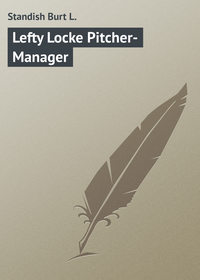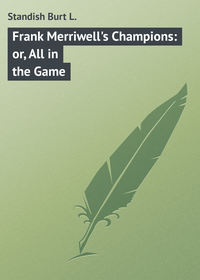 полная версия
полная версияFrank Merriwell's Triumph: or, The Disappearance of Felicia
“In the soft and stilly hours of the night which followed I seated myself in the Snowbird, applied my feet to the mechanism, pressed the spring of the gravity destroyer, and away I scooted over Penobscot Bay. When the sun rose the following morning it found Cap’n Bean’s shipyard empty and little Walter and his flying machine gone.
“I was on hand when Santos-Dumont arrived in New York. I sought an interview with him, and I told him I proposed making him look like a plugged quarter when he gave his exhibition. I challenged him to sail against me and told him I would show him up. Santy didn’t seem to like this, and he made remarks which would not look well in the Sabbath School Herald. Indeed, he became violent, and, though I tried to soothe him, I discovered myself, when the interview ended, sitting on the sidewalk outside of the building and feeling of my person for bumps and sore spots.
“You can imagine with what dignity I arose to my feet and strode haughtily away. More than ever was I determined to make old Santy look like an amateur in the flying business. However, he took particular pains while in New York to scoot around in his machine when he knew I was not informed that such was his intention. With a great deal of craft and skill he avoided coming in competition with me. One day some part of his jigger got out of gear and he had it removed into the country to fix it. I located him and followed him up. I have forgotten the name of the village where I found him; but the people were getting much excited, for he had stated that at a certain time he would show them what he could do.
“He had gathered scientific men from Oshkosh, Skowhegan, Chicago, and other centres of culture and refinement. Among them was Professor Deusenberry, of the Squedunk Elementary College of Fine Fatheads. I succeeded in getting at Professor Deusenberry’s ear. He had a generous ear, and there was not much trouble in getting at it. I told him all about my Snowbird, and informed him that I had her concealed near at hand and proposed to show up Santos when he broke loose and sailed. I took him around to see my craft; but when he looked her over he shook his head and announced that she’d never rise clear of the skids on which I had her elevated above the ground.
“Well, mates, the great day came around, and promptly at the hour set Santos rose like a bird in the air. I was watching for him, and when I saw him gliding about over the village I promptly started the Snowbird going. The moment I shut off the power of gravitation I scooted upward like a wild swan. I made straight for Dumont’s old machine, and there before the wildly cheering people, whose shouts rose faint and sweet to my ear, I proceeded to do a few stunts. I circled around Santos when he was at his best speed. I sailed over him and under him, and I certain gave him an attack of nervous prostration. In his excitement he did something wrong and knocked his machine out of kilter, so that he suddenly took a collapse and fell into the top of a tree, where his old craft was badly damaged. I gently lowered myself to the ground, and as I stepped out of the Snowbird Professor Deusenberry clasped me to his throbbing bosom and wept on my breast.
“‘Professor Wiley!’ he cried, ‘beyond question you have solved the problem of aërial navigation. Professor Wiley – ’ ‘Excuse me, Professor Deusenberry’ said I, ‘but I am simply plain Cap’n Wiley, a salty old tar of modesty and few pretensions. I have no rightful claim to the title of professor.’
“‘But you shall have – you shall have!’ he earnestly declared. ‘I will see that you’re made professor of atmospheric nullity at the Squedunk Elementary College of Fine Fatheads. Your name shall go ringing down through the corridor of the ages. Your name shall stand side by side in history with those of Columbus, Pizarro, and Richard Croker.’
“That night I was wined, and dined, and toasted in that town, while Santos-Dumont stood outside and shivered in the cold. The scientific men and professors and men of boodle gazed on me in awe and wonderment and bowed down before me. Professor Deusenberry was seized with a determination to own the Snowbird. He was fearful lest some one else should obtain her, and so he hastened to get me to set a price upon her. I was modest. I told him that I was modest. I told him that in the cause of science I was ready to part with her for the paltry sum of five thousand dollars. In less than ten minutes he had gathered some of the moneyed fatheads of his college and bought my flying machine.
“I suggested to them that the proper way to start her was to get her onto some eminence and have some one push her off. The following morning they raised her to the flat roof of a building, and, with no small amount of agitation, I saw that Professor Deusenberry himself contemplated making a trip in her. When they pushed her off he started the paddle wheels going, but without the effect of my little gravity destroyer to keep her from falling. She dropped straight down to the ground. When they picked the professor up, several of his lateral ribs, together with his dispendarium, were fractured. I thought his confidence in me was also broken. At any rate, I hastened to shake the dust of that town from my feet and make for the tall timber.
“Nevertheless, mates, my little experience with Santos-Dumont so disgusted and discouraged him that he immediately left this country, which explains something that has been puzzling the people for a long time. They wondered why he didn’t remain and do the stunts he had promised to do. Even now I fancy that Santy often dreams in terror of Cap’n Wiley and his Snowbird.”
CHAPTER III.
THE MAP VANISHES
While Cap’n Wiley had been relating this yarn Merriwell seemed utterly unconscious of his presence. Having produced his field glasses from the case at his side, he was surveying the impregnable valley. Suddenly he started slightly and touched Bart’s arm.
“Look yonder, Hodge,” he said, in a low tone. “Away up at the far end of the valley where the timber is, I can see smoke rising there.”
“So can I!” exclaimed Hodge. “What does it mean?”
“There is but one thing it can mean, and that is – ”
“There’s some one in the valley.”
“Sure, sure,” agreed Cap’n Wiley. “Somebody has found a passage into that harbor.”
“Do you suppose,” asked Hodge, in consternation, “that there are other parties searching for that mine?”
“It’s not unlikely.”
“But you were the only one told of its existence by Benson Clark.”
“Still, it’s likely others knew he was prospecting in this vicinity.”
“It will be hard luck, Merry, if we find that some one has relocated that claim ahead of us.”
“That’s right,” nodded Frank. “The fact that there is smoke rising from that part of the valley proves it is not impossible to get down there. It’s too late to-day to make any further effort in that direction. We will return to the camp and wait for morning.”
“And if you find other men on the claim, what will you do?”
“I haven’t decided.”
“But it belongs to you!” exclaimed Hodge earnestly. “Clark located it, and when he died he gave you the right to it.”
“Nevertheless, if some one else has found it and has registered his claim, he can hold it.”
“Not if you can prove Clark staked it off and posted notices. Not if you can prove he gave it to you.”
“But I can’t prove that. Clark is dead. He left no will. All he left was quartz in his saddlebags and some dust he had washed from the placer, together with this map I have in my pocket. You see, I would find it impossible to prove my right to the mine if I discovered other parties in possession of it.”
Bart’s look of disappointment increased.
“I suppose that’s right, Merry,” he confessed; “but it doesn’t seem right to me. The Consolidated Mining Association of America tried to take your Queen Mystery Mine from you on a shabbier claim than you have on this mine here.”
“But I defeated them, Bart. You must not forget that.”
“I haven’t forgotten it,” Hodge declared, nodding his head. “All the same, you had hard work to defeat them, and, later, Milton Sukes made it still harder for you.”
“But I triumphed in both cases. Right is right, Bart; it makes no difference whether it is on my side or the other fellow’s.”
“That’s so,” Hodge confessed. “But it would be an almighty shame to find some one else squatting on that claim. I’d like to get down into that valley now!”
“It can’t be done before nightfall, so we will go back to camp.”
They set out, and an hour later they reached their camp in a small valley. There they had pitched a tent near a spring, and close at hand their horses grazed. As they approached the tent, little Abe came hobbling up to them.
“I am glad you’re back,” he declared. “That man has been going on just awful.”
“Who? Worthington?” questioned Merry.
“Yes; he said over and over that he knew his ghost would be lost. He declared his ghost was in danger. He said he could feel the danger near.”
“More of his wild fancies,” said Hodge.
“Mates,” observed Cap’n Wiley, “if there’s anything that upsets my zebro spinal column it is a crazy gentleman like that. I am prone to confess that he worries me. I don’t trust him. I am afraid that some morning I will wake up and find a hatchet sticking in my head. I should hate to do that.”
“I am positive he is harmless,” declared Merry. “Where is he, Abe?”
“I don’t know now. A while ago he just rushed off, calling and calling, and he’s not come back.”
Frank looked alarmed. “He promised me he would stay near the camp. He gave me his word, and this is the first time he has failed to obey me implicitly in everything.”
“He said he’d have to go to save you.”
“It was a mistake bringing him here, Frank,” asserted Hodge.
“But what could I do with him? He wouldn’t remain behind, and I knew the danger of leaving him there. Any day he might escape from the valley and lose himself in the desert to perish there.”
“Perhaps that is what will happen to him now.”
Merry was sorely troubled. He made preparations to go in search of Worthington without delay. But even as he was doing so the deranged man came running back into the camp and fell panting at his feet.
“I have found you again, my ghost!” he cried. “They are after you! You must beware! You must guard yourself constantly!”
“Get up, Worthington!” said Merry. “I am in no danger. No one can hurt a ghost, you know.”
“Ah! you don’t know them – you don’t know them!” excitedly shouted the lunatic. “They are wicked and dangerous. I saw them peering over those rocks. I saw their evil eyes. Abe was asleep. I had been walking up and down, waiting for you to return. When I saw them I stood still as a stone and made them believe I was dead. They watched and watched and whispered. They had weapons in their hands! You must be on your guard every minute!”
“I have heard about crazy bedbugs,” muttered Wiley; “but I never saw one quite as bad as this. Every time I hear him go on that way I feel the need of a drink. I could even partake of a portion of Easy Street firewater with relish.”
Worthington seized Frank’s arm.
“You must come and see where they were – you must come and see,” he urged.
“Never mind that now,” said Merry. “I will look later.”
“No! no! Come, now!”
“Be still!” commanded Merry sharply. “I can’t waste the time.”
But the maniac continued to plead and beg until, in order to appease him, Merry gave in.
Worthington led him to a mass of bowlders at a distance, and, pointing at them, he declared in a whisper:
“There’s where they were hiding. Look and see. There is where they were, I tell you!”
More to pacify the poor fellow than anything else, Frank looked around amid the rocks. Suddenly he made a discovery that caused him to change countenance and kneel upon the ground. Bart, who had sauntered down, found him thus.
“What is it, Frank?” he asked.
“See here, Hodge,” said Merry. “There has been some one here amid these rocks. Here’s a track. Here’s a mark where the nails of a man’s boot heel scratched on the rocks.”
Hodge stood looking down, but shook his head.
“You have sharper eyes than I, Frank,” he confessed. “Perhaps Worthington has been here himself.”
“No! no!” denied the deranged man. “I was afraid to come! I tell you I saw them! I tell you I saw their wicked eyes. This is the first time I have been here!”
“If he tells the truth,” said Frank, “then it is certain some one else has been here.”
Behind Worthington’s back Bart shook his head and made signals expressive of his belief that whatever signs Frank had discovered there had been made by Worthington.
“Now, you see,” persisted the madman; “now you know they were here! Now you know you must be on your guard!”
“Yes, yes,” nodded Merry impatiently. “Don’t worry about that, Worthington. I will be on my guard. They will not take me by surprise.”
This seemed to satisfy the poor fellow for the time being, and they returned to the tent. There a fire was again started and supper was prepared. Shadows gathered in the valley and night came on. Overhead the bright stars were shining with a clear light peculiar to that Southwestern land.
After supper they lay about on the ground, talking of the Enchanted Valley, as Merry had named it, and of the mysterious smoke seen rising from it. Later, when little Abe and Cap’n Wiley were sleeping and Worthington had sunk into troubled slumber, through which he muttered and moaned, Frank and Bart sat in the tent and examined the map by the light of a small lantern.
“Beyond question, Merry, the mine is near here. There is not a doubt of it. Here to the east is Hawley Peak, to the south lies Clear Creek. Here you see marked the stream which must flow through that valley, and here is the cross made by Clark, which indicates the location of his claim.”
They bent over the map with their heads together, sitting near the end of the tent. Suddenly a hand and arm was thrust in through the perpendicular slit in the tent flap. That arm reached over Frank’s shoulder, and that hand seized the map from his fingers. It was done in a twinkling, and in a twinkling it was gone.
With shouts of astonishment and dismay, both Frank and Bart sprang up and plunged from the tent. They heard the sounds of feet running swiftly down the valley.
“Halt!” cried Merry, producing a pistol and starting in pursuit.
In the darkness he caught a glimpse of the fleeing figure.
“Stop, or I fire!” he cried again.
There was no answer. Flinging up his hand, he began shooting into the gloom. He did not stop until he had emptied the weapon. Having run on some distance, he paused and listened, stopping Bart with an outstretched hand.
Silence lay over the valley.
“Did you hit him?” asked Bart.
“I don’t know,” confessed Frank.
“I can hear nothing of him.”
“Nor I.”
“You may have dropped him here.”
“If not – ”
“If not, my map is gone.”
As he was talking, Frank threw open his pistol and the empty shells were ejected. He deftly refilled the cylinder.
“By George, Merry!” whispered Bart, “Worthington may have been right when he told you he saw some one beyond those bowlders.”
“He was.”
“Then we have been followed! We have been spied upon!”
“No question about it.”
“Who did it?”
“That’s for us to find out.”
Together they searched for the man at whom Frank had fired in the darkness. They found nothing of him. From the tent little Abe began calling to them. Then Worthington came hurrying and panting through the darkness seeking them.
“They have gone!” declared the man wildly. “They were here! In my sleep I felt them! In my sleep I saw them!”
“We must have a light, Hodge,” said Frank. “Bring the lantern.”
Bart rushed back to the tent and brought the lantern. With it Frank began examining the ground.
“Poor show of discovering any sign here,” he muttered.
After a time, however, he uttered an exclamation and bent over.
“What have you found?” questioned Hodge excitedly.
“See here,” said Frank, pointing on the ground before him.
On a rock at their feet they saw fresh drops of blood.
“By Jove, you did hit him!” burst from Bart’s lips. “If we can follow that trail – ”
“We will find the man who has that map,” said Merry grimly. “I wonder how badly he is wounded.”
“Blood!” moaned Worthington. “There is blood on the ground! There is blood in the air! There is death here! Wherever I go there is death!”
“Keep still!” said Frank sharply. “Look out for Abe, Bart.”
Then he began seeking to follow the sanguine trail with the aid of the lighted lantern. It was slow work, but still he made some progress.
“We’re taking big chances, Merry,” said Bart, who had a pistol in his hand.
“It’s the only way we can follow him.”
“Beware!” warned Worthington, in a hollow whisper. “I tell you there is death in the air!”
They had not proceeded far when suddenly a shot rang out and the bullet smashed the lantern globe, extinguishing the light. Hodge had been expecting something of the sort, and he fired almost instantly in return, aiming at the flash he had vaguely seen.
“Are you hurt, Merry?” he asked.
“No; the lantern was the only thing struck. Did you see where the shot came from?”
“I caught a glimpse of the flash.”
Then a hoarse voice hailed them from the darkness farther down the valley.
“You gents, there!” it called.
They did not answer.
“Oh, Frank Merriwell!” again came the call.
“It’s somebody who knows you,” whispered Hodge.
“What is it?” called Merry, in response.
“You holds up where you are!” returned the voice, “or you eats lead a-plenty.”
“Who are you?”
“That’s what you finds out if you come. If you wants to know so bad, mebbe you ambles nearer and takes your chances o’ getting shot up.”
“It’s sure death to try it,” warned Hodge, in a whisper.
“Death and destruction!” Worthington screamed. “It is here! Come away! Come away!”
He seized Merry and attempted to drag him back. Frank was forced to break the man’s hold upon him.
“I must save you!” the deranged man panted. “I knew it would come! Once I left you to perish in the flames; now I must save you!”
He again flung himself on Frank, and during the struggle that followed both Hodge and Wiley were compelled to render assistance. Not until the madman had been tripped and was held helpless on the ground did he become quiet.
“It’s no use!” he groaned; “I can’t do it! It is not my fault!”
Merry bent close and stared through the gloom at the eyes of the unfortunate man.
“You must obey me,” he said, in that singular, commanding tone of his. “You have to obey me! Go back to the tent!”
Then he motioned for Hodge to let Worthington up, and Bart did so. Without further resistance or struggling, the man turned and walked slowly back to the tent.
“Go with him, Wiley, and take Abe with you.”
Although Wiley protested against this, Frank was firm, and the sailor yielded. Then, seeking such shelter as they could find amid the rocks and the darkness, Bart and Frank crept slowly toward the point from which that warning voice had seemed to come. A long time was spent in this manner, and when they reached the spot they sought they were rewarded by finding nothing.
“He has gone, Frank,” muttered Hodge. “While we were struggling with Worthington, he improved the opportunity to escape.”
“I fear you are right,” said Merriwell.
Further investigation proved this was true. In vain they searched the valley. The mysterious unknown who had snatched the map and who had been wounded in his flight by Frank had made good his escape.
CHAPTER IV.
THE NIGHT WATCH
They were finally compelled to give up the search, although they did so with the greatest reluctance.
“Unless it aids the other fellow to locate the claim first,” said Bart, “the loss of the map cannot be much of a disadvantage to you, Merry. It could give us no further assistance in finding the claim.”
“That’s true,” muttered Frank. “But the fact that mysterious men have been prowling around here and one of them has secured the map seems to indicate there are others who are searching for Benson Clark’s lost claim. If they locate it first – ”
“It’s rightfully yours!” growled Hodge. “No one else has a real claim to it. Clark gave it to you.”
“But he made no will.”
“All the same, you know he gave it to you.”
“We have discussed all that, Hodge,” said Merry as they returned to the tent. “If other parties find the claim first and begin work on it, they can hold it.”
Wiley was teetering up and down in front of the tent, apparently in an uneasy state of mind.
“I have faced perils by sea and land!” he exclaimed, as they approached. “It doesn’t behoove any one to shunt me off onto a lunatic and a cripple when there is danger in the air. My fighting blood is stirred, and I long to look death in the mouth and examine his teeth.”
Neither Merry nor Bart paid much attention to the spluttering sailor. They consulted about the wisdom of changing their camping place for the night.
“I don’t think it is necessary,” said Frank. “Whoever it was, the prowler secured the map, and I fancy it will satisfy him for the present. Something assures me that was what he was after, and we have nothing more of interest to him now.”
After a time they decided to remain where they were and to take turns in guarding the camp. The first watch fell on Bart, while Frank was to take the middle hours of the night, and Wiley’s turn came toward morning. It was found somewhat difficult to quiet Worthington, who remained intensely wrought up over what had happened; but in time Merry induced him to lie down in the tent.
Little Abe crept close to Frank and lay there, shivering somewhat.
“You have so many enemies, Frank,” he whispered. “Who are these new enemies you have found here?”
“I don’t know at present, Abe; but I will find out in time.”
“Why must you always have enemies?”
“I think it is the fortune of every man who succeeds to make enemies. Other men become jealous. Only idiots and spineless, nerve-lacking individuals make no enemies at all.”
“But sometime your enemies will hurt you,” muttered the boy fearfully. “You can’t always escape when they are prowling about and striking at your back.”
“Of course, there is a chance that some of them may get me,” confessed Frank; “but I am not worrying over that now.”
“Worthington frightens me, too,” confessed the boy. “He is so strange! But, really and truly, he seems to know when danger is near. He seems to discover it, somehow.”
“Which is a faculty possessed by some people with disordered brains. I fancied the fellow was dreaming when he declared he saw some one hiding behind those rocks to-day; but now I know he actually saw what he claimed to see.”
“Oh, I hope they don’t get that mine away from you! You have taken so much trouble to find it!”
“Don’t worry,” half laughed Merry. “If they should locate the mine ahead of me, I can stand it. I have two mines now, which are owned jointly by myself and my brother.”
“Your brother!” exclaimed Abe, in surprise. “Why, have you a brother?”
“Yes; a half-brother.”
“Where is he?”
“He is attending school far, far away in the East. I received some letters from him while you were in Denver.”
“Is he like you?”
“Well, I don’t know. In some things he seems to be like me; in others he is different.”
“He is younger?”
“Yes, several years younger.”
“Oh, I’d like to see him!” breathed Abe. “I know I’d like him. What’s his name?”
“Dick.”
“Perhaps I’ll see him some day.”
“Yes, Abe, I think you will. By and by we will go East, and I will take you to see him at Fardale. That’s where he is attending school.”
“It must be just the finest thing to go to school. I never went to school any. What do they do there, Frank?”
“Oh, they do many things, Abe. They study books which prepare them for successful careers, and they play baseball and football and take part in other sports. They have a fine gymnasium, where they exercise to develop their bodies, which need developing, as well as their brains. In some schools, Abe, the development of the body is neglected. Scholars are compelled to study in close rooms, regardless of their health and of their individual weaknesses. And many times their constitutions are wrecked so that they are unfitted to become successful men and women through the fact that they have not the energy and stamina in the battle of life, at which successes must be won.









